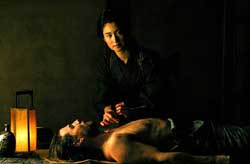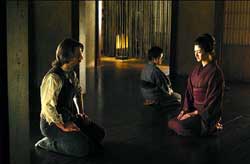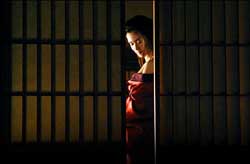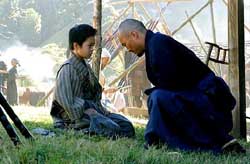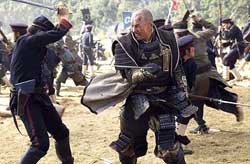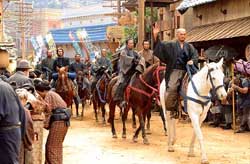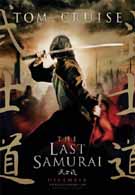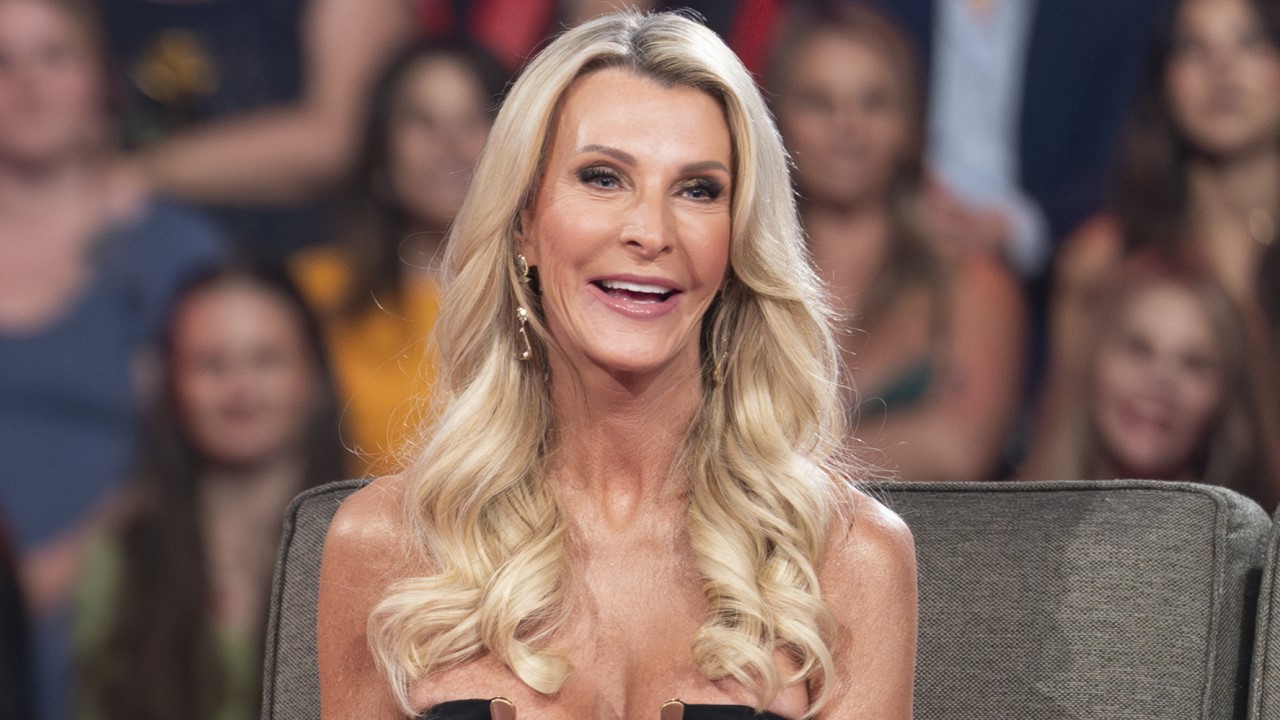On a Tuesday night piling into a packed out theater, I wasn't sure what to expect from Tom Cruise' latest, The Last Samurai. Even though Cruise is an admittedly good actor his celebrity persona is so pervasive that it has become almost impossible to separate the characters he plays from the superstar man we've all had repeatedly shoved down our throats. Yet as it turns out, Cruise is just one small part of making Last Samurai a fantastic, pitch perfect epic in which at least for this film, Tom Cruise just being Tom Cruise is plenty good enough.
Directed by Edward Zwick, Samurai picks up the story of Captain Nathan Algren (Tom Cruise), a courageous American Cavalry soldier burnt out on hunting Indians and wracked with guilt over a slaughter ordered by his commanding officer. We find him exactly where Cruise himself might end up should his career ever go south: Drunk, depressed, and using what's left of his celebrity to sell sub-standard products. So, when an old army buddy, Sgt. Grant (Billy Connolly in perhaps his greatest role), shows up with the deal of a lifetime Algren is only too happy to listen. The Japanese are looking for western commanders to help modernize their army and Algren's reputation for skill just happens to fit their bill. The money is good and Algren is out of both money and luck. So he heads for Japan to work over a group of hastily drafted Japanese troopers. Things go poorly and Algren ends up captured by the very rebels he was sent there to repress: A band of dwindling Samurai led by the charismatic Samurai warlord Katsumoto (Ken Watanabe). Katsumoto is fighting a war for more than just some random political aim. He fights to preserve his way of life, his culture, and his country from being overrun by the Emperor’s heedless rush to replace their world with prefabricated western "civilization."
The Last Samurai is a rare form of epic; equal parts visual beauty, heart pounding action, and emotionally stimulating uber-drama of the type you just don’t see anymore outside of say, Peter Jackson’s Lord of the Rings trilogy. Zwick makes brilliant use of cinematography by John Toll to produce a vibrant and fragile vision of Japan. Through his work it’s easy to see why Algren might fall so totally in love with this land and its people. Battles, when they do happen, are sharp paced and brutal without going overboard on cinematic gore. They do throw in enough grit to keep the movie rated "R", but do so without pushing the limits of weaker audience bowels. Not an easy task when you've got 500 warriors chopping it up with katanas, in a movie where you just can't get away with NOT showing it.
Cynical nitpickers will no doubt be quick to point out similarities between Last Samurai and Dances With Wolves. However, beyond a few thematic parallels such criticism is unworthy, though I'm sure Kevin Costner and his struggling career might welcome it. Like that belated Costner classic, Last Samurai soars not just as some war torn, sword slinging drama, but as a delicate and detailed look at a dying culture. In large part that's due to the work of Ken Watanabe, who is electric as the honor bound Katsumoto, giving what is without a doubt one of the best performances of this year. He struggles with a duty to his people, his honor, and his emperor without giving thought to life and limb. He gives Algren a second chance, risking his people based only on a hazy dream. Best of all, he doesn't seem to be some westernized vision of what we think a Japanese Samurai ought to be. He, like every inch of this film, is wringing wet with genuine Japanese culture.
On the other hand, Cruise is Cruise and looks suitably heroic and handsome, whether holding a rifle or whirling around with a Samurai sword. Talk of an Oscar for him is insanely overrated not because he does poorly, but because he merely does what is required. A performance like this isn't as much of a stretch, especially when compared to the more difficult roles he's tackled in films like Magnolia or Vanilla Sky. Instead, it's more on par with his work in Top Gun. That might seem odd when you consider all the back-story that's been written into his character and I don't in any way mean to imply that Algren doesn't have depth. It's just that portraying that depth in an effective manner doesn't require anything more from the always talented Cruise than he's normally used to giving. Pretty boy Tommy is unchallenged yet solid as the film's centerpiece and that's fine because it leaves plenty of room for better, more ancillary characters (like Katsumoto) to swing smartly around him.
So, when Algren finds himself trapped in an enemy village, The Last Samurai digs in for the long haul, giving us plenty of time to linger on the people and places that we're about to end up fighting for. This, not the film's magnificent battles, is what truly makes Samurai such an epic masterpiece. Much of the film is spoken in Japanese as Algren struggles to communicate in a world where almost no one speaks his language. His conversations with Katsumoto, who does speak English, are simultaneously humorous and touching. He also develops a growing relationship with the Japanese woman and her family he stays with, as well as a silent affection for the warrior sent to guard him, affectionately nicknamed "Bob".
Throughout this, Samurai avoids shoehorning one of those obligatory love stories into an otherwise carefully balanced film. Yes, there is a woman and yes she's beautiful. But she is also Japanese which means that Samurai can't attempt to turn her into some westernized Greta Garbo. In other words there's no emotionally charged love moment where the two fall into each others arms and exchange passionate kisses to release pent up sexual tension at the end of the film. Nor does Tom Cruise attempt to impress her by riding a cow. Their relationship grows slowly and incompletely, bound by the constraints of Japanese inhibition and honor, leading down a road that Last Samurai may or may not follow without hampering Algren's better story of personal growth.
Once Algren begins to become the man we all sit around hoping he can be, Zwick kicks the movie into katana overdrive, giving Algren an opportunity to first prove his Samurai mettle in a scene that will long be remembered as the best of its kind. You'll know it when you see it and if I tell your more I'll spoil it. But this, like all the action in Samurai, is impossibly eye popping with a vibe reminiscent of the best of Kurosowa somehow updated with the best slickness of modern day Hollywood. Frankly, it wasn't the big army clashes that caught me, good as those were. Rather, it's the little one on one battles, or the crazy move that Cruise pulls off to take down a soldier with a gun, or back to back fighting in a bottle necked room, that made me cheer even after I left the theater.
The Last Samurai is epic filmmaking at its absolute finest. Even an ending, which requires a little forgiveness in the interests of believability, does nothing to tarnish the wondrous and gut wrenching success of Zwick’s creation. The deep, delicate threads of honor, friendship, and duty he winds between even his most minor characters carries The Last Samurai onto a plane head and shoulders above the usual war movie crowd.
